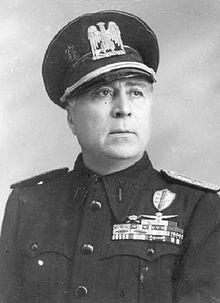Roberto Farinacci
Roberto Farinacci (born October 16, 1892 in Isernia , Molise , † April 28, 1945 in Vimercate , Lombardy ) was an Italian lawyer , journalist and fascist politician . From 1925 to 1926 he was general secretary of the Partito Nazionale Fascista . In the 1920s, Farinacci was able to influence the PNF's propaganda through his anti-Semitic attitude and was one of the best-known anti-Semites alongside Interlandi and Preziosi .
Life
Adolescence
Farinacci, the son of a security guard, first came to Tortona in Piedmont and then to Cremona with his family at the age of eight . After primary school, he found a job as a railway clerk in Cremona, which he held for twelve years. Very early on he showed political interests and was involved in the trade union movement, where he helped to restructure the union of agricultural workers. Benito Mussolini invited him to work on Il Popolo d'Italia . This cooperation was prevented by the outbreak of World War I, in which he participated as a volunteer. After the war he left the Partito Socialista Riformista Italiano with Leonida Bissolati and was a founding member of the Fasci di combattimento Mussolini in March 1919 . Farinacci was now anxious to close his educational gaps. He succeeded in catching up with his Abitur in a very short time, and so he then obtained his doctorate in law with a thesis that raised suspicions of plagiarism. Other sources speculate that he received his degree rather "honoris causa" and possibly under pressure. In addition, he was engaged in Cremona as " Ras " (commander, loan from Ethiopia) of the local fascio, whereby his actions were characterized by particular brutality.
Mussolini's “right hand”
He rose rapidly within the party. In 1921 Farinacci was elected Member of Parliament and initially worked with Achille Starace on a large propaganda campaign in the Trentino / South Tyrol region. In 1922 he founded the newspaper "Cremona Nuova", which in 1929 was renamed "Il Regime Fascista". He represented the right wing of the party, which Mussolini considered too liberal, and was one of the best-known representatives on the right wing of the party who had already been anti-Semitic at an early age . Conversely, Mussolini found him too brutal and irresponsible. In 1925 Mussolini appointed him party secretary, making him the second most powerful man in the regime. But in 1926 it broke. Farinacci resigned, and thousands of Farinacci radical supporters were removed from office. The Ras were ousted and the state administration strengthened. Farinacci then worked as a lawyer. In 1935 he took part in the Abyssinian War as a member of the Milizia Volontaria per la Sicurezza Nazionale (MVSN) and was promoted to lieutenant general. He lost an arm while fishing with hand grenades. In the same year he was accepted into the Fascist Grand Council , a clear sign that his favor had risen again. Farinacci took part in the Spanish Civil War as an observer , became a minister in 1938 and campaigned for the Italian racial laws ( leggi razziali ).
War and end
When the war began, Farinacci was one of the few officials who advocated a swift entry into the war. He had very good connections with the Nazi leaders, especially Göring , and became Mussolini's adviser to Germany. In 1941 Farinacci became inspector general of the militia deployed in Albania . In July 1943 he voted for Mussolini in the Great Fascist Council . After Mussolini's arrest, he fled to Germany, where they were already considering transferring the parts of Italy not yet occupied by the Allies to him. But then Otto Skorzeny managed to free Mussolini from the Eiche company . Farinacci now returned to Cremona and no longer took part in political life. Towards the end of the war he was arrested and shot by partisans.
literature
- Harry Fornari: Mussolini's Gadfly: Roberto Farinacci (Nashville 1971)
- Ivone Kirkpatrick: Mussolini. A Study in Power (New York 1964)
- Roy MacGregor Hastie: The Day of the Lion. The Life and Death of fascist Italy 1922-1945 (New York 1964)
- Roberto Farinacci: The Fascist Revolution. 3 volumes. Munich 1941
Web links
- Newspaper article about Roberto Farinacci in the 20th century press kit of the ZBW - Leibniz Information Center for Economics .
Individual evidence
- ↑ a b Thomas Schlemmer, Hans Woller: Italian Fascism and the Jews 1922 to 1945 . In: Vierteljahrshefte für Zeitgeschichte . Issue 2, April 2005, p. 164–202 ( Online [PDF; 7,8 MB ]). Here p. 172.
- ↑ Denis Mack Smith: Storia d'Italia 1861-1961 (Laterza, Bari, 1972)
| personal data | |
|---|---|
| SURNAME | Farinacci, Roberto |
| BRIEF DESCRIPTION | Italian lawyer, journalist and fascist politician |
| DATE OF BIRTH | October 16, 1892 |
| PLACE OF BIRTH | Isernia , Molise |
| DATE OF DEATH | April 28, 1945 |
| Place of death | Vimercate , Lombardy |
